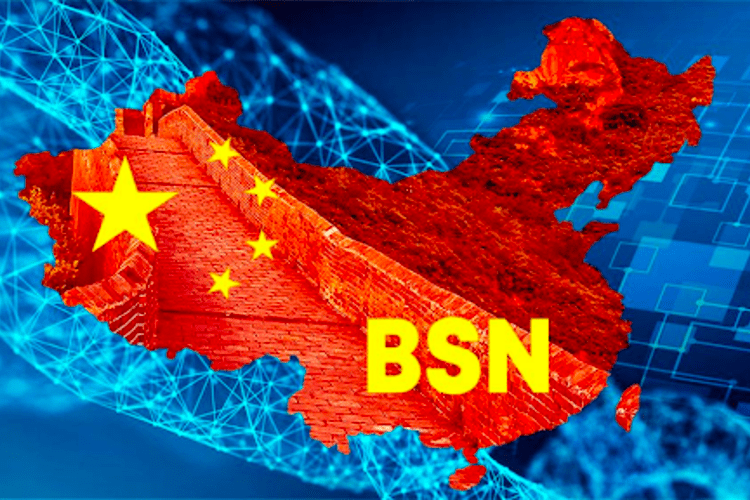China Proceeds With BSN, While Chairman Calls Cryptocurrencies “Ponzi”

President Xi Jinping of China has said that his nation must "seize the chances" given by blockchain technology to remain competitive. A major advance in the independent invention of essential technologies was cited by the Chinese leader during a speech in 2019. When President Trump spoke about blockchain and other cutting-edge technology in his State of the Union address earlier this year, he elevated the topic to one of China's top national priorities. Since then, China has quietly been developing a framework to make it easier for businesses to use blockchain technology. "Blockchain-based Service Network" (BSN).
China Is Interested In Blockchain But Not in Crypto, According to BSN Chairman
Cross-border money transactions, according to proponents of the technology, may be made more efficient and transparent with the aid of blockchain. Smart contracts, another feature of the blockchain, are critical. When a set of predetermined circumstances are satisfied in the code, these contracts will be automatically executed.
Those who support them argue that they are essential in areas like international trade finance. Yifan He, CEO of Red Date Technology, told CNBC that "we believe blockchain technology is so strong that it will revolutionize the whole internet and practically all of the complete IT system architecture.”
As one of the first participants of China's Blockchain-based Service Network, Red Date Technology is proud to be a founding member. CNBC spoke with Paul Triolo, the technology policy director at consultancy company Albright Stonebridge, who said that China's government sees blockchain-based technology as a low-barrier-to-entry technology sector, and wants Chinese entrepreneurs to use blockchain applications to resolve real-world issues.
Quite the contrary, Yifan He has recently called various kinds of cryptocurrencies and their supposed Ponzi-like nature. Published in The People’s Daily on June 26, the article refers to private cryptocurrencies as the “biggest Ponzi scheme in human history.” Whether the blockchain is public or private has a significant impact – blockchains with permissionless access, also known as trustless or public blockchains, enable anybody with the right software or hardware to join and possibly make modifications to the blockchain. In contrast, those blockchains that aren't public and are known as private blockchains can be considered trustful as they provide limited access to the individuals.
The BSN chairman also added that he personally never had owned any of crypto assets, however still believes that stablecoins could be doing just fine if it’s properly regulated: “USDC or USDT are payment-related currencies, not speculative assets. Once they are fully regulated, they are fine.”
Yifan He praised stablecoins earlier in 2020, planning to integrate such payments into BSN, however cancelling the plan with the impostment of cryptocurrency ban in Chinese jurisdiction. So what is the current agenda of BSN then?
China’s BSN Goes Fintech
Cloud computing infrastructure providers in particular are BSN's target market. Alternatively, it might be a company that maintains its private cloud or intranet, such as Amazon or Microsoft. BSN claims to be a "one-stop-shop" for deploying these blockchain applications on the cloud, a procedure that would otherwise be expensive and time-consuming.
There may be difficulties in working together if two banks each have an application developed on a separate blockchain platform. As the business connects many blockchains, any apps created on top of BSN technology will be compatible. This solution would be ideal for businesses that wish to employ many blockchain apps inside their company, but don't have the resources to install a large number of additional servers. The concept is that a corporation or government may utilize BSN's platform to quickly and cheaply develop blockchain applications.
For major corporations that don't want to deal with the volatility and danger of digital currency, non-crypto blockchains may be an attractive alternative. Start-up BSN was founded in part by Red Date Technology, a Hong Kong-based company. However, the initiative is also supported by Chinese government-affiliated organizations. This includes China's strong National Development and Reform Commission's State Information Center (SIC).
State-owned telecoms provider China Mobile is also on board with the endeavor. BSN aspires to become a worldwide brand. The Chinese government's ties to the company might make it more difficult. "BSN has piqued the imagination of many because of its audacious nature." Triolo from Albright Stonebridge remarked that the Chinese government's relationship to this aspiration has led to a lot of scrutiny. According to him, BSN is "trying to isolate the BSN International element from the local activities, and [trying] to remove itself from Chinese government sponsorship."
“It's a massive, enormous issue," he said when questioned about the company's plans to expand worldwide and the notion that it’s related to the Chinese government. Open-source code would be available for public inspection for any possible backdoors in the platform's international edition, he added.
Additionally, BSN's blockchain attempts may face a worldwide issue because of its centralized structure. Decentralized blockchain technology and China's professed desire to encourage a local blockchain development environment are fundamentally incompatible, according to Blockchain.com's Garrick Hileman, director of research. Because of this, “China has little hope of becoming a worldwide leader in this strategically technological area” unless it learns to embrace disruptive power and loss of centralized control. It is also worth mentioning that even though China has high hopes for becoming a leader with the use of this new technology, some experts, like Garrick Hileman, are skeptical and think that BSN won't go the way its creators think it will. So, it’s a matter of time what will be in the future and whether or not other countries and nations embrace BSN.